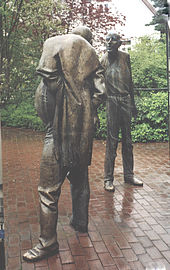Gôgen joke


The Gôgen joke is a literary short form that goes back to the Tübingen wine-growers who are known locally as " Gôgen ".
The Gôgen joke is mostly about the rough reactions of this rural indigenous population to excessive belief in progress and overly scientific behavior in Tübingen, which was becoming a university town between 1890 and 1960, or often the tension between the neighboring (formerly the Free Imperial City, richer) city of Reutlingen . In 1916 Gôgen jokes appeared for the first time in print, collected and edited as a field edition under the pseudonym 'Romeo' by Hermann Cuhorst, Karl Kommerell and Victor Kommerell . Their distribution among the Württemberg soldiers was approved by King Wilhelm II of Württemberg.
Numerous expansions and adaptations appeared later, including those by Heinz-Eugen Schramm , which were also available as a speech record series , later as a CD with Max Strecker and others. a. has been published.
Examples
Since viticulture in Tübingen largely came to a standstill in the first half of the 20th century, most of the Gôgen jokes refer to the situation in the 19th or early 20th century. Here are two examples (for another example, see Stuttgart Higher Regional Court # "The dispute" ):
- A Reutlingen wine grower, also known as "Huser", raises a Gôgen because of the hard Tübingen grapes: "Do miaß-er halt d'Elefande vo d'r Wilhelma zom Träpple come lao!" - "Schao reacht", replies the Gog, “Mr hent au schao gschreiben, but dia know net come; There would be no fiaß from letschde Johr, dia Elefande, where z ' Reidleng' gwea is! "
- A Gôg asks for a laxative in the pharmacy. However, he accidentally receives hydrochloric acid. The next day the pharmacist discovers the mix-up and - fearing the worst - rushes to the Gôgen's apartment. He breathes a sigh of relief when he sees him safe and sound. Enlightened about the mistake, the Gôg just laughs and says: “Now nothing wondering! So that's why hao-ni noch-em bronze tomorrow is all about Löchle en de Stiefel! "
But there are also some jokes that relate to the situation in the second half of the 20th century, i.e. no longer from the time of viticulture, e.g. B .:
- A French occupation soldier who fell into the Neckar and cannot swim shouts: “Au secours! au secours! "A lifeguard plunges into the water, but a Gôg leans over the bridge railing and calls out" O Mändle, hetsch au gscheiter schwemma glernt, instead of French. "
There is also a Tübingen Gôgen hymn ("En dr Näckarhalde sieba") by the Riverside Jazz Band.
literature
- Heinz-Eugen Schramm (Ed.): Tübinger Gogen-Witze. The classic collection guarantees genuine, spicy Gogen jokes, brought into a valid and final form as a general educational contribution by the Tübingen wine-growers knowledgeable about the topic and the place. Schlichtenmayer, Tübingen 1959 (thereafter repeatedly reissued by different publishers, e.g. Körner 1975, Knödler 1988, and without circumflex ).
- Tübingen Gogen jokes . First edition 1916. Unchanged new edition. ISBN 3-88466-000-4 , 80 pages.
Web links
- spapo.de
- Article about Gogenwitze at Tübingen Stadtwiki Tüpedia